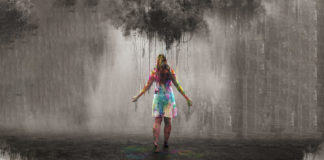Does life have meaning, or not?
When I ponder the statement, “Life holds potential meaning under any condition, even the most miserable,” the story of an anonymous woman comes to my mind. She made a deep impression on me and taught me about two existential states: having, and being.
Nine tips for taming tempers
I walked into my boss’s office. For several years I’d been trying to manage a full-time job on part-time hours, complete my master's degree, support my husband in his career and run a busy home occupied by three children. The previous month, a friend had died tragically and unexpectedly, and in the previous week several major work and family crises had been bouncing...
Choosing happy
Paul was imprisoned by the Roman Emperor. He was on Death Row. Every morning, when he opened his eyes, he didn’t know if this day would be his last, and whether he would be thrown to the lions or burned.
The sleep of reason and Goya’s monsters
"If I were tortured, I would confess to anything. I would confess to being the Sultan of Turkey," says Goya in a film by Milos Forman. "No, you wouldn't!" Father Lorenzo contradicts him, but Goya insists: "I would confess anything to avoid torment."
Circumstantial faith
As a believer—for present purposes, defined simply as one who believes—I have often wondered what and how I would believe differently had I been born into a family and culture with different beliefs. Obviously, I believe what I believe because I believe it to include truth, but would I have believed in this same truth if I had not been raised and taught...
Forgiving a Nazi
May 1944. The train stopped at the station and twins Eva and Miriam, with their father and mother and sisters Edit and Aliz, stepped out into the sunlight. There was war in Europe and the Nazis had gathered them and thousands of other Jews in Romania, crammed them into cattle cars and taken them to Poland.
Appeal to popularity. What explains the popularity of an error?
When we consider that a conclusion is founded only if a lot of people consider it true, we fall into the trap of the argumentum ad populum or the appeal to popularity.
Good or bad: How we come to love negative characters
It is as surprising as it is real: negative characters like Dexter Morgan, from the eponymous Dexter, and Walter White, from Breaking Bad, have been cropping up in popular culture more and more often lately. Since when, how, and why have anti-heroes gained so much popularity?
The (un)expected Messiah
“God's viewpoint is sometimes different from ours—so different that we could not even guess at it unless He had given us a Book which tells us such things.”[1](Corrie ten Boom)
I used to fear God
I have read the Parable of the Talents many times, and have understood it in different ways at different times in my life. During my last read, I came across a commentary concerning the man who was given only one talent, which he chose to bury. Author Ellen White writes: The Lord desires His people to reach the highest round of the ladder...
Organic or conventional: a challenging food choice
The controversy surrounding organic foods is far from being resolved. Some argue it’s merely a marketing tool aimed at emptying consumers’ pockets, while others believe they’ve found the path to better health, provided they can afford the luxury.
Should I ever regret anything?
Two popular songs in the second half of the twentieth century have influenced entire generations, to this day, with a message we can call at least provocative: "Non, Je ne regrette rien" ("I do not regret anything"),[1] crooned to us by Edith Piaf, and "My Way", Frank Sinatra's melodic boast.[2]
The secrets of a successful failure
Not many management books can be read with the pleasure of reading a novel, because few are so well written. Donald Keough's book is one of those few.
The kindness that wipes away the effects of daily stress
Daily stress is a good excuse to avoid other people's needs, but this choice is a double loss. The kindness we display to make other people's days better is a very strong antidote to the high level of stress we experience daily.
1,000 years later
Christianity is fundamentally built on the belief that the life and mission of Jesus Christ on earth were a continuation and fulfilment of God’s earlier revelation, known as the Old Testament.


























